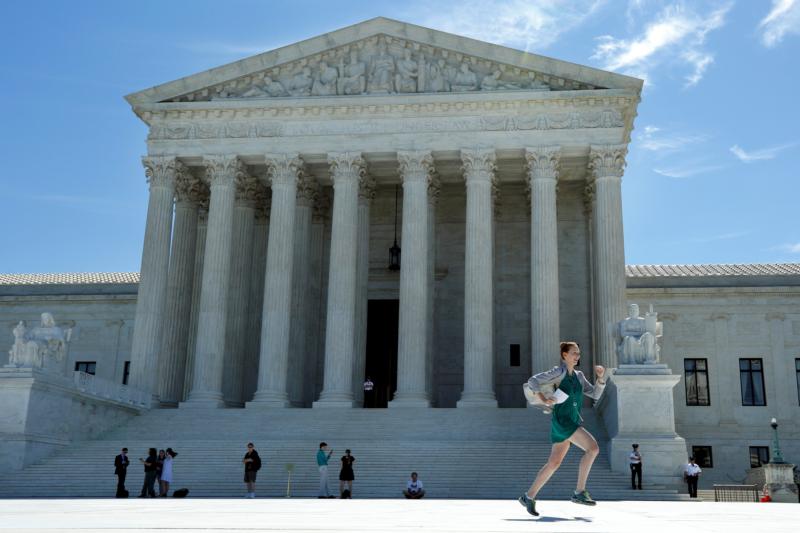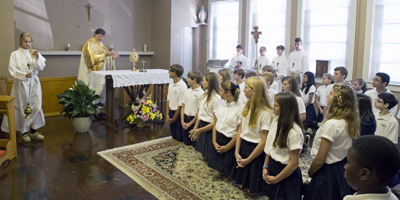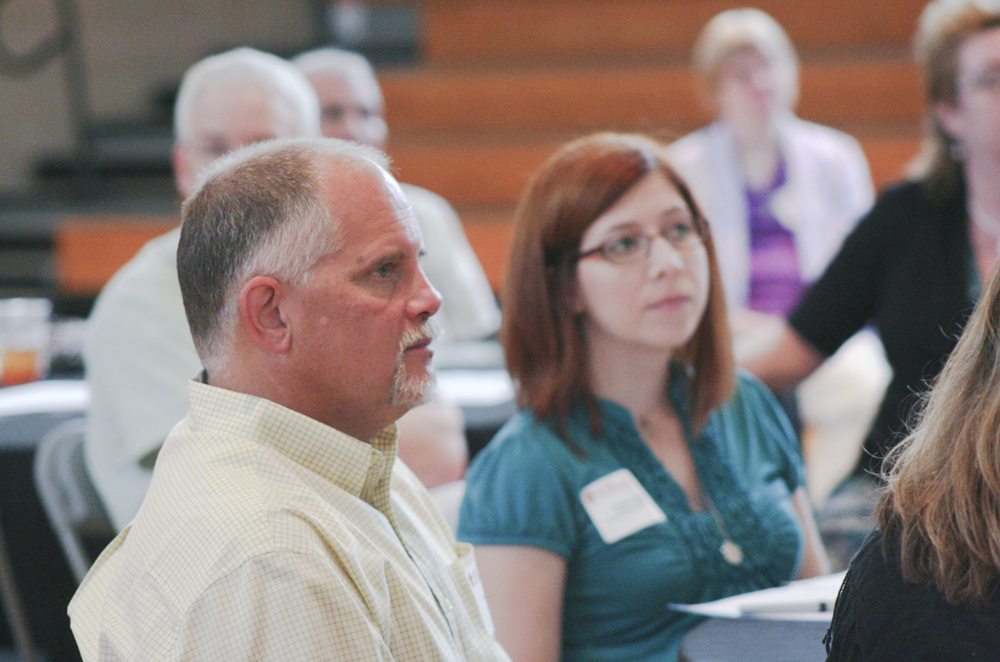
WASHINGTON—The U.S. Supreme Court announced June 26 that it will hear a case involving President Donald Trump’s travel ban, which seeks to delay entry into the country to immigrants from six majority-Muslim countries and suspend for a time the entry of all refugees.
In the meantime, the court said, some parts of the ban will be able to go into effect.
The ban “may not be enforced against foreign nationals who have a credible claim of a bona fide relationship with a person or entity in the United States,” the court said, but “all other foreign nationals are subject to the provisions of (the executive order).”
Denying entry to immigrants with no connection to the country “does not burden any American party,” the court said.
The troubled executive order went into litigation almost as soon as it was issued just a week into the new president’s term Jan. 27. It has been revised, but those revisions, too, have faced challenges.
The U.S. Catholic bishops have opposed the ban, particularly the provision that suspends entry of all refugees for at least four months.
“We remain deeply troubled by the human consequences of the revised executive order on refugee admissions and the travel ban,” Bishop Joe S. Vasquez of Austin, Texas, said in a statement as chairman of the U.S. Conference of Catholic Bishops’ Committee on Migration, which came after the executive order’s second revision.
The Wedding Cake
The Supreme Court also agreed to hear a Colorado baker’s appeal in a wedding cake case, and made a decision that a church school can’t be barred from state funds.
The court said June 26 that it will hear arguments next term on whether a Denver baker unlawfully discriminated against a same-sex couple in declining to make them a wedding cake.
The justices agreed to hear an appeal from Jack Phillips, owner of Masterpiece Cakeshop, after lower courts ruled he had violated Colorado’s anti-discrimination law. Phillips has contended that the law violated his rights to freedom of speech and the free exercise of religion.
Similar cases in courts across the country have involved florists and other service-oriented business owners who say their religious beliefs prohibit them from providing services to same-sex couples. The owners have met with little success in the courts, which have determined that public businesses must comply with anti-discrimination laws.
The Supreme Court had considered whether to hear the Phillips case for weeks. Justices declined in 2014 to review a New Mexico Supreme Court case that found that a photographer violated a state civil rights law when she declined to photograph a lesbian couple’s commitment ceremony.
Since then, the court has ruled that marriage is a fundamental right and marriage licenses cannot be denied to same-sex couples nationwide.
In the cake case, Charlie Craig and David Mullins approached Masterpiece Cakeshop to order a cake for their wedding reception. They had planned to marry in Massachusetts, where same-sex marriage was legal at the time, and hold a reception in Colorado.
Phillips refused to discuss the request, telling Craig and Mullins that his religious beliefs would not allow him to provide the cake. He said other bakeries could accommodate the request though.
The couple filed a complaint with the Colorado Civil Rights Commission, which decided that the baker’s action violated state law. The Colorado Court of appeals upheld the commission’s decision. The shop owner petitioned the Colorado Supreme Court to review the case, but the court declined.
In July 2016, the bakery asked the U.S. Supreme Court to review the case, which is called Masterpiece Cakeshop v. Colorado Civil Rights Commission.
In another case, the justices reversed an Arkansas Supreme Court ruling, saying the state must list same-sex parents on birth certificates. The argument centered on whether a state violates the 14th Amendment by denying married same-sex couples the same right afforded to married opposite-sex couples under state law to have the name of the birth mother’s spouse entered as the second parent on their child’s birth certificate.
Justices Samuel A. Alito Jr., Clarence Thomas and Neil M. Gorsuch, the newest member of the court, dissented, saying the law regarding such issues is not yet settled.
Church school decision
In the case involving the church school, the Supreme Court handed down a 7-2 decision June 26 that said a Lutheran preschool should not be excluded from a state grant program to refurbish its playground surface just because it is a religious entity.
“The exclusion of Trinity Lutheran from a public benefit for which it is otherwise qualified, solely because it is a church, is odious to our Constitution all the same, and cannot stand,” wrote Chief Justice John Roberts in the court’s opinion.
The court’s decision reverses a ruling by the 8th U.S. Circuit Court of Appeals that had sided with the state’s 2015 decision to exclude the school from obtaining grant funds.
Roberts said the appeals court decision made it clear that the Trinity Lutheran preschool was “put to the choice between being a church and receiving a government benefit,” and the answer they were given was: “No churches need apply.”
At issue in Trinity Lutheran Church v. Comer was the school’s denial of grant reimbursement to nonprofit groups for the cost of purchasing and installing playground surfaces using recycled tires through a state program.
Missouri’s Department of Natural Resources, which administers the playground resurfacing program, ranked Trinity Lutheran’s grant application fifth out of the 44 it received. The department, which funds 14 grants, said it denied the school’s application because the state constitution prohibits state funds from going “directly or indirectly, in aid of any church, sect or denomination of religion.”
For Trinity Lutheran, the bigger issue was the school’s constitutional right to the free exercise of religion, which was a key point in oral arguments presented to the court in April.
The court’s opinion noted that the school was not claiming “any entitlement to a subsidy” but was asserting its “right to participate in a government benefit program without having to disavow its religious character.”
It also said the case indicated discrimination against religious exercise not just in “the denial of a grant, but rather the refusal to allow the church — solely because it is a church — to compete with secular organizations for a grant.”
The court stressed that this case was unlike Locke v. Davey, a 2004 court ruling which said federally funded scholarships were not required to go to college students who were receiving divinity degrees. In the preschool case, the playground grant was not related to religion.
Roberts, writing the court’s 19-page opinion, said the student in question in the Davey case was not denied a scholarship because of who he was but “because of what he proposed to do — using taxpayer funds in a clergy training program.” In the playground resurfacing case, Roberts wrote: “There is no question that Trinity Lutheran was denied a grant simply because of what it is — a church.”
Roberts’ opinion states from the outset that he did not concur with footnote No. 3. The footnote in question says: “This case involves express discrimination based on religious identity with respect to playground resurfacing. We do not address religious uses of funding or other forms of discrimination,” which may limit the scope of the ruling.
Justices Clarence Thomas and Neil Gorsuch made similar distinctions. Justices Anthony Kennedy, Samuel Alito and Elena Kagan concurred in full with the opinion. Justice Sonia Sotomayor issued a 27-page dissenting opinion joined by Justice Ruth Bader Ginsburg.
Sotomayor said the court described the Lutheran school decision as “a simple case about recycling tires to resurface a playground,” but she warned that the “stakes are higher.”
She said the court’s ruling “profoundly changes” the relationship between church and state “by holding, for the first time, that the Constitution requires the government to provide public funds directly to a church.”
Hannah Smith, senior counsel at Becket, a nonprofit religious liberty law firm, called the court’s decision “good for kids and good for religious liberty.”
Becket filed a filed a friend-of-the-court brief on the school’s behalf as did the U.S. Conference of Catholic Bishops, the Missouri Catholic Conference, the National Catholic Educational Association, the Church of Jesus Christ of Latter-day Saints, the General Synod of the Reformed Church in America and the Salvation Army.
“This decision is significant because seven of the justices agreed that churches can’t be treated as second-class citizens when it comes to widely available public safety benefits,” said Smith.
Catholic News Service / Rhina Guidos and Carol Zimmermann of Catholic News Service contributed to this report.
CNS photo/Yuri Gripas, Reuters: A news assistant runs past the U.S. Supreme Court in Washington after the justices announced they would hear President Donald Trump’s travel ban case in October and also said that in the meantime, a limited version of the ban could take effect while the legal battle continues.



